Organisational Analysis Assignment 1 - Critical Analysis of Papers
VerifiedAdded on 2022/10/19
|10
|1807
|163
Homework Assignment
AI Summary
This assignment presents a critical analysis of four research papers related to organizational analysis, matching them to the four rationales discussed in lectures: functionalism, radical structuralism, social relativism, and neohumanism. The student deconstructs each paper, examining the authors' arguments, methods of persuasion, and underlying assumptions. The analysis includes a discussion of how the papers align with different organizational paradigms, drawing on concepts of knowledge legitimacy and the influence of information technology. The assignment explores the rhetoric of ICT in education, the evolution of learning languages, and the integration of technology in classrooms. Each paper is evaluated based on its context, methods, and conclusions, and the student provides their opinion on the most appropriate paradigm for each paper. The student also references the work of Hirschheim and Klein, as well as other relevant literature.
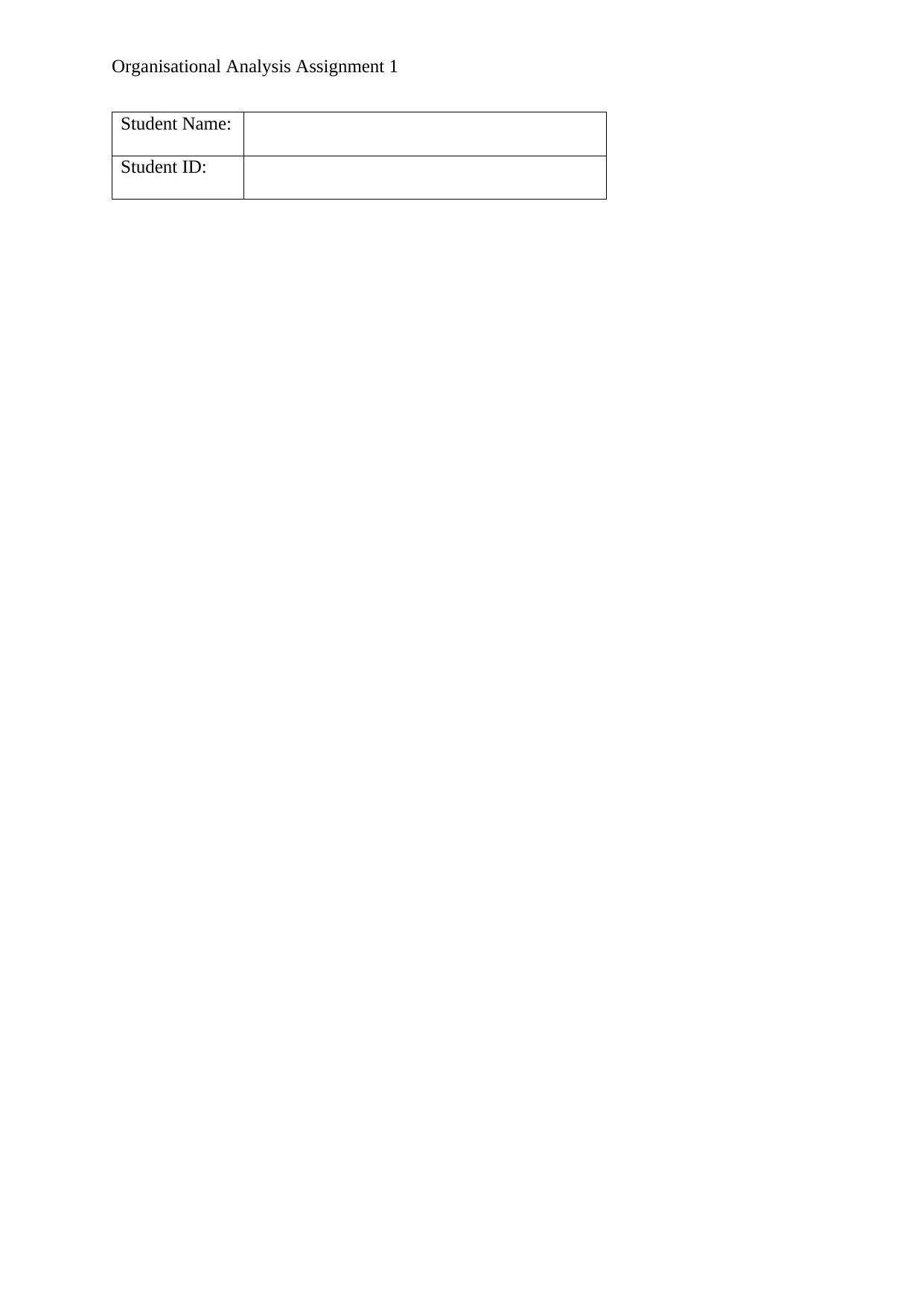
Organisational Analysis Assignment 1
Student Name:
Student ID:
Student Name:
Student ID:
Paraphrase This Document
Need a fresh take? Get an instant paraphrase of this document with our AI Paraphraser
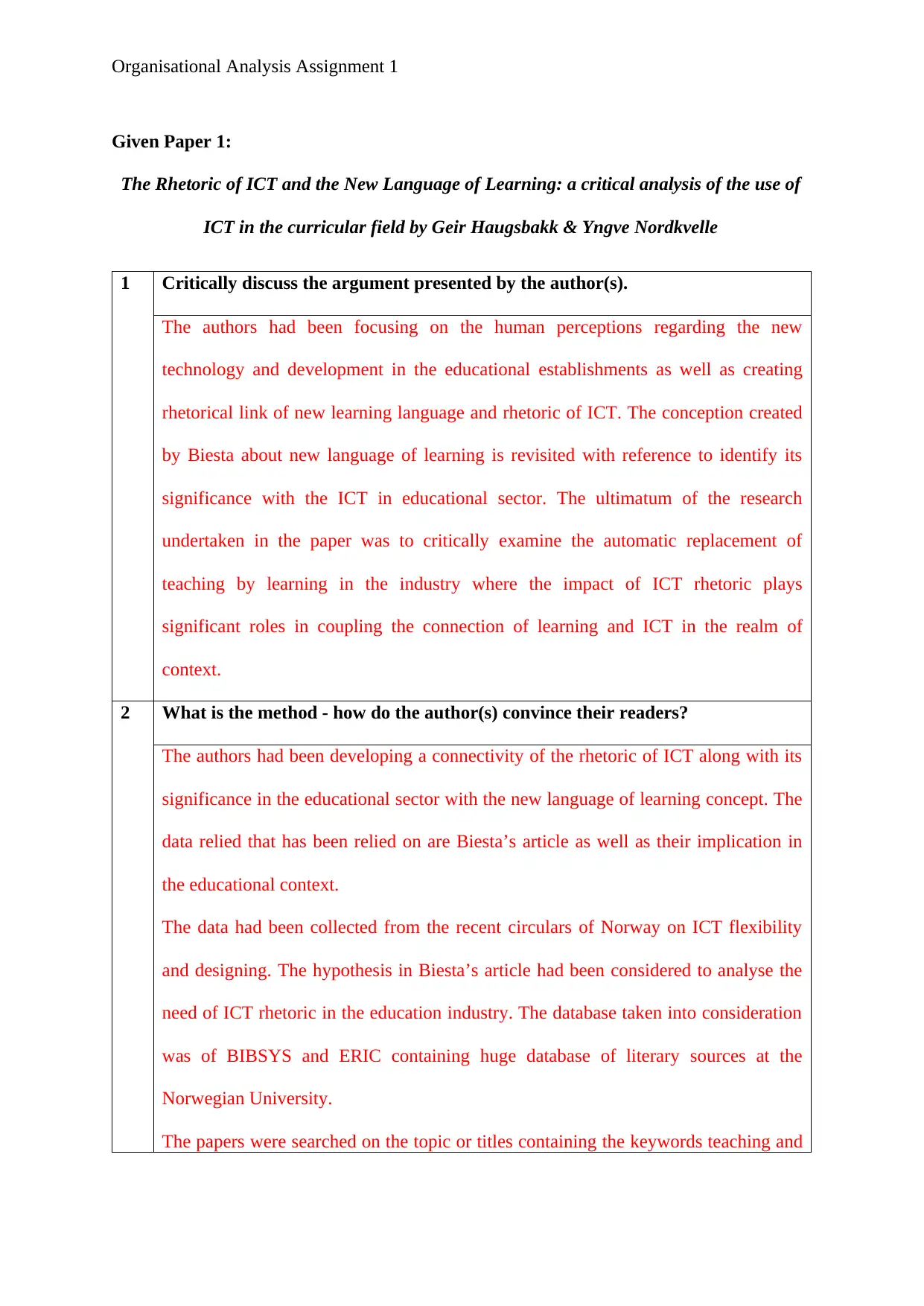
Organisational Analysis Assignment 1
Given Paper 1:
The Rhetoric of ICT and the New Language of Learning: a critical analysis of the use of
ICT in the curricular field by Geir Haugsbakk & Yngve Nordkvelle
1 Critically discuss the argument presented by the author(s).
The authors had been focusing on the human perceptions regarding the new
technology and development in the educational establishments as well as creating
rhetorical link of new learning language and rhetoric of ICT. The conception created
by Biesta about new language of learning is revisited with reference to identify its
significance with the ICT in educational sector. The ultimatum of the research
undertaken in the paper was to critically examine the automatic replacement of
teaching by learning in the industry where the impact of ICT rhetoric plays
significant roles in coupling the connection of learning and ICT in the realm of
context.
2 What is the method - how do the author(s) convince their readers?
The authors had been developing a connectivity of the rhetoric of ICT along with its
significance in the educational sector with the new language of learning concept. The
data relied that has been relied on are Biesta’s article as well as their implication in
the educational context.
The data had been collected from the recent circulars of Norway on ICT flexibility
and designing. The hypothesis in Biesta’s article had been considered to analyse the
need of ICT rhetoric in the education industry. The database taken into consideration
was of BIBSYS and ERIC containing huge database of literary sources at the
Norwegian University.
The papers were searched on the topic or titles containing the keywords teaching and
Given Paper 1:
The Rhetoric of ICT and the New Language of Learning: a critical analysis of the use of
ICT in the curricular field by Geir Haugsbakk & Yngve Nordkvelle
1 Critically discuss the argument presented by the author(s).
The authors had been focusing on the human perceptions regarding the new
technology and development in the educational establishments as well as creating
rhetorical link of new learning language and rhetoric of ICT. The conception created
by Biesta about new language of learning is revisited with reference to identify its
significance with the ICT in educational sector. The ultimatum of the research
undertaken in the paper was to critically examine the automatic replacement of
teaching by learning in the industry where the impact of ICT rhetoric plays
significant roles in coupling the connection of learning and ICT in the realm of
context.
2 What is the method - how do the author(s) convince their readers?
The authors had been developing a connectivity of the rhetoric of ICT along with its
significance in the educational sector with the new language of learning concept. The
data relied that has been relied on are Biesta’s article as well as their implication in
the educational context.
The data had been collected from the recent circulars of Norway on ICT flexibility
and designing. The hypothesis in Biesta’s article had been considered to analyse the
need of ICT rhetoric in the education industry. The database taken into consideration
was of BIBSYS and ERIC containing huge database of literary sources at the
Norwegian University.
The papers were searched on the topic or titles containing the keywords teaching and
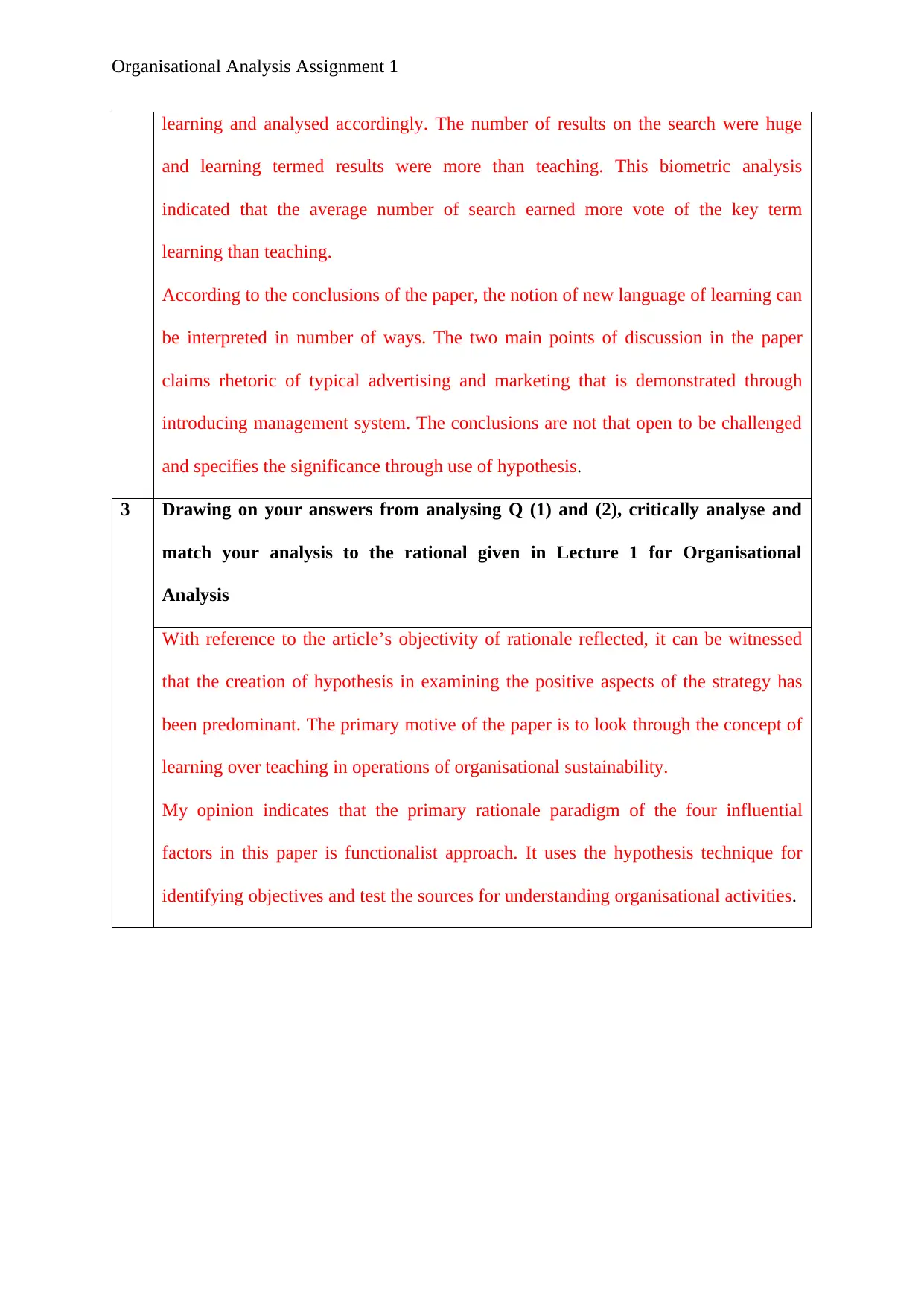
Organisational Analysis Assignment 1
learning and analysed accordingly. The number of results on the search were huge
and learning termed results were more than teaching. This biometric analysis
indicated that the average number of search earned more vote of the key term
learning than teaching.
According to the conclusions of the paper, the notion of new language of learning can
be interpreted in number of ways. The two main points of discussion in the paper
claims rhetoric of typical advertising and marketing that is demonstrated through
introducing management system. The conclusions are not that open to be challenged
and specifies the significance through use of hypothesis.
3 Drawing on your answers from analysing Q (1) and (2), critically analyse and
match your analysis to the rational given in Lecture 1 for Organisational
Analysis
With reference to the article’s objectivity of rationale reflected, it can be witnessed
that the creation of hypothesis in examining the positive aspects of the strategy has
been predominant. The primary motive of the paper is to look through the concept of
learning over teaching in operations of organisational sustainability.
My opinion indicates that the primary rationale paradigm of the four influential
factors in this paper is functionalist approach. It uses the hypothesis technique for
identifying objectives and test the sources for understanding organisational activities.
learning and analysed accordingly. The number of results on the search were huge
and learning termed results were more than teaching. This biometric analysis
indicated that the average number of search earned more vote of the key term
learning than teaching.
According to the conclusions of the paper, the notion of new language of learning can
be interpreted in number of ways. The two main points of discussion in the paper
claims rhetoric of typical advertising and marketing that is demonstrated through
introducing management system. The conclusions are not that open to be challenged
and specifies the significance through use of hypothesis.
3 Drawing on your answers from analysing Q (1) and (2), critically analyse and
match your analysis to the rational given in Lecture 1 for Organisational
Analysis
With reference to the article’s objectivity of rationale reflected, it can be witnessed
that the creation of hypothesis in examining the positive aspects of the strategy has
been predominant. The primary motive of the paper is to look through the concept of
learning over teaching in operations of organisational sustainability.
My opinion indicates that the primary rationale paradigm of the four influential
factors in this paper is functionalist approach. It uses the hypothesis technique for
identifying objectives and test the sources for understanding organisational activities.
⊘ This is a preview!⊘
Do you want full access?
Subscribe today to unlock all pages.

Trusted by 1+ million students worldwide
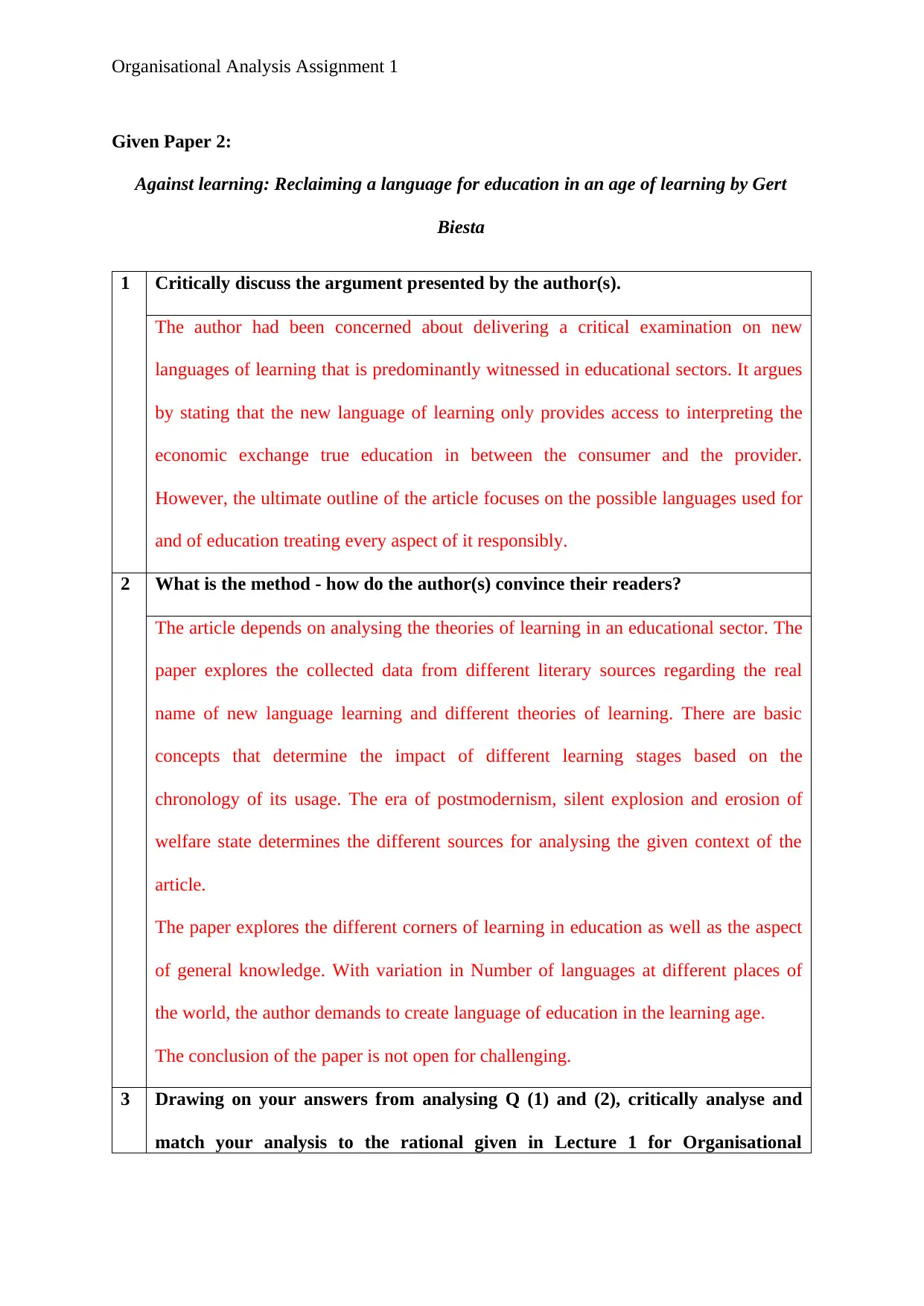
Organisational Analysis Assignment 1
Given Paper 2:
Against learning: Reclaiming a language for education in an age of learning by Gert
Biesta
1 Critically discuss the argument presented by the author(s).
The author had been concerned about delivering a critical examination on new
languages of learning that is predominantly witnessed in educational sectors. It argues
by stating that the new language of learning only provides access to interpreting the
economic exchange true education in between the consumer and the provider.
However, the ultimate outline of the article focuses on the possible languages used for
and of education treating every aspect of it responsibly.
2 What is the method - how do the author(s) convince their readers?
The article depends on analysing the theories of learning in an educational sector. The
paper explores the collected data from different literary sources regarding the real
name of new language learning and different theories of learning. There are basic
concepts that determine the impact of different learning stages based on the
chronology of its usage. The era of postmodernism, silent explosion and erosion of
welfare state determines the different sources for analysing the given context of the
article.
The paper explores the different corners of learning in education as well as the aspect
of general knowledge. With variation in Number of languages at different places of
the world, the author demands to create language of education in the learning age.
The conclusion of the paper is not open for challenging.
3 Drawing on your answers from analysing Q (1) and (2), critically analyse and
match your analysis to the rational given in Lecture 1 for Organisational
Given Paper 2:
Against learning: Reclaiming a language for education in an age of learning by Gert
Biesta
1 Critically discuss the argument presented by the author(s).
The author had been concerned about delivering a critical examination on new
languages of learning that is predominantly witnessed in educational sectors. It argues
by stating that the new language of learning only provides access to interpreting the
economic exchange true education in between the consumer and the provider.
However, the ultimate outline of the article focuses on the possible languages used for
and of education treating every aspect of it responsibly.
2 What is the method - how do the author(s) convince their readers?
The article depends on analysing the theories of learning in an educational sector. The
paper explores the collected data from different literary sources regarding the real
name of new language learning and different theories of learning. There are basic
concepts that determine the impact of different learning stages based on the
chronology of its usage. The era of postmodernism, silent explosion and erosion of
welfare state determines the different sources for analysing the given context of the
article.
The paper explores the different corners of learning in education as well as the aspect
of general knowledge. With variation in Number of languages at different places of
the world, the author demands to create language of education in the learning age.
The conclusion of the paper is not open for challenging.
3 Drawing on your answers from analysing Q (1) and (2), critically analyse and
match your analysis to the rational given in Lecture 1 for Organisational
Paraphrase This Document
Need a fresh take? Get an instant paraphrase of this document with our AI Paraphraser
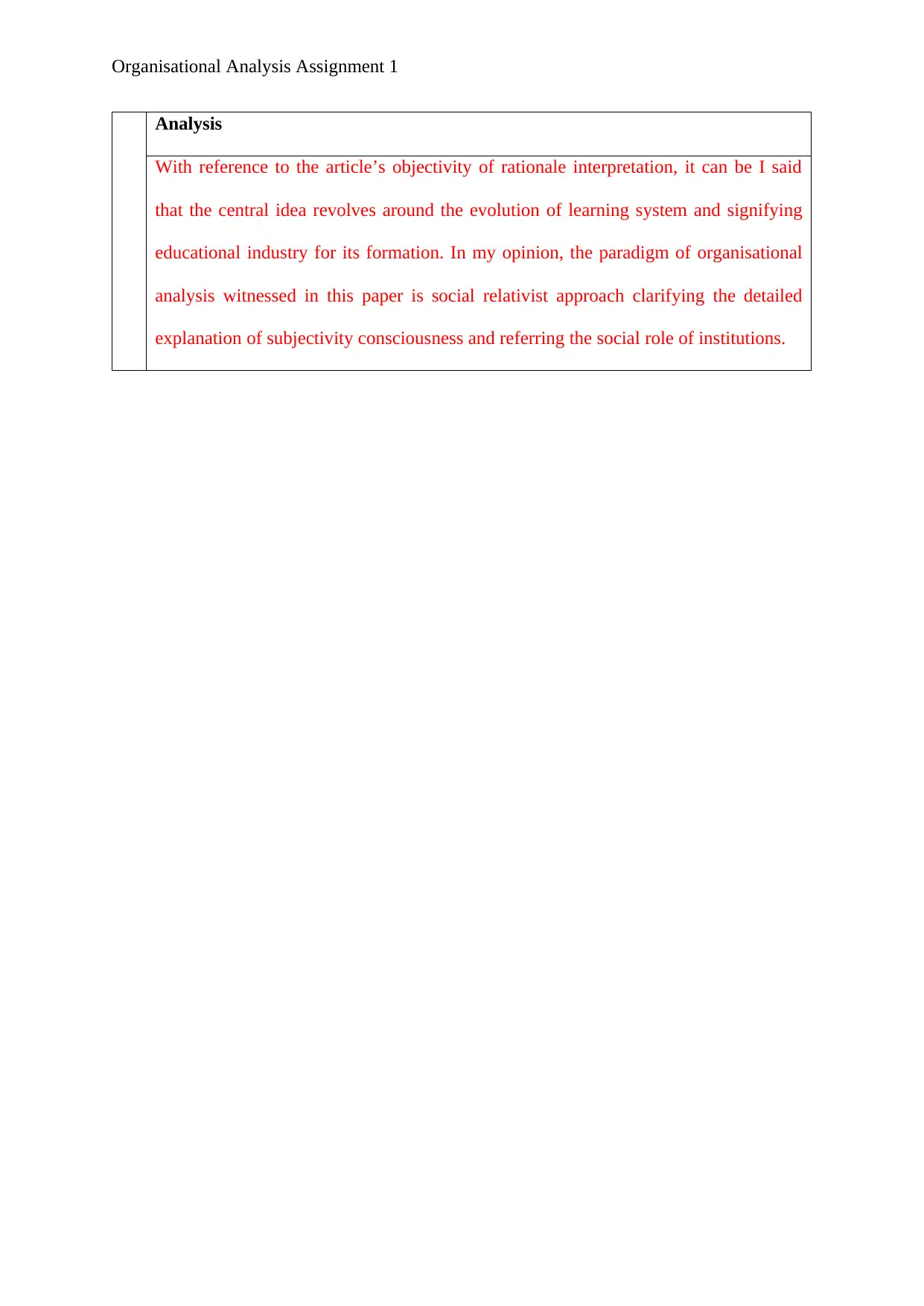
Organisational Analysis Assignment 1
Analysis
With reference to the article’s objectivity of rationale interpretation, it can be I said
that the central idea revolves around the evolution of learning system and signifying
educational industry for its formation. In my opinion, the paradigm of organisational
analysis witnessed in this paper is social relativist approach clarifying the detailed
explanation of subjectivity consciousness and referring the social role of institutions.
Analysis
With reference to the article’s objectivity of rationale interpretation, it can be I said
that the central idea revolves around the evolution of learning system and signifying
educational industry for its formation. In my opinion, the paradigm of organisational
analysis witnessed in this paper is social relativist approach clarifying the detailed
explanation of subjectivity consciousness and referring the social role of institutions.
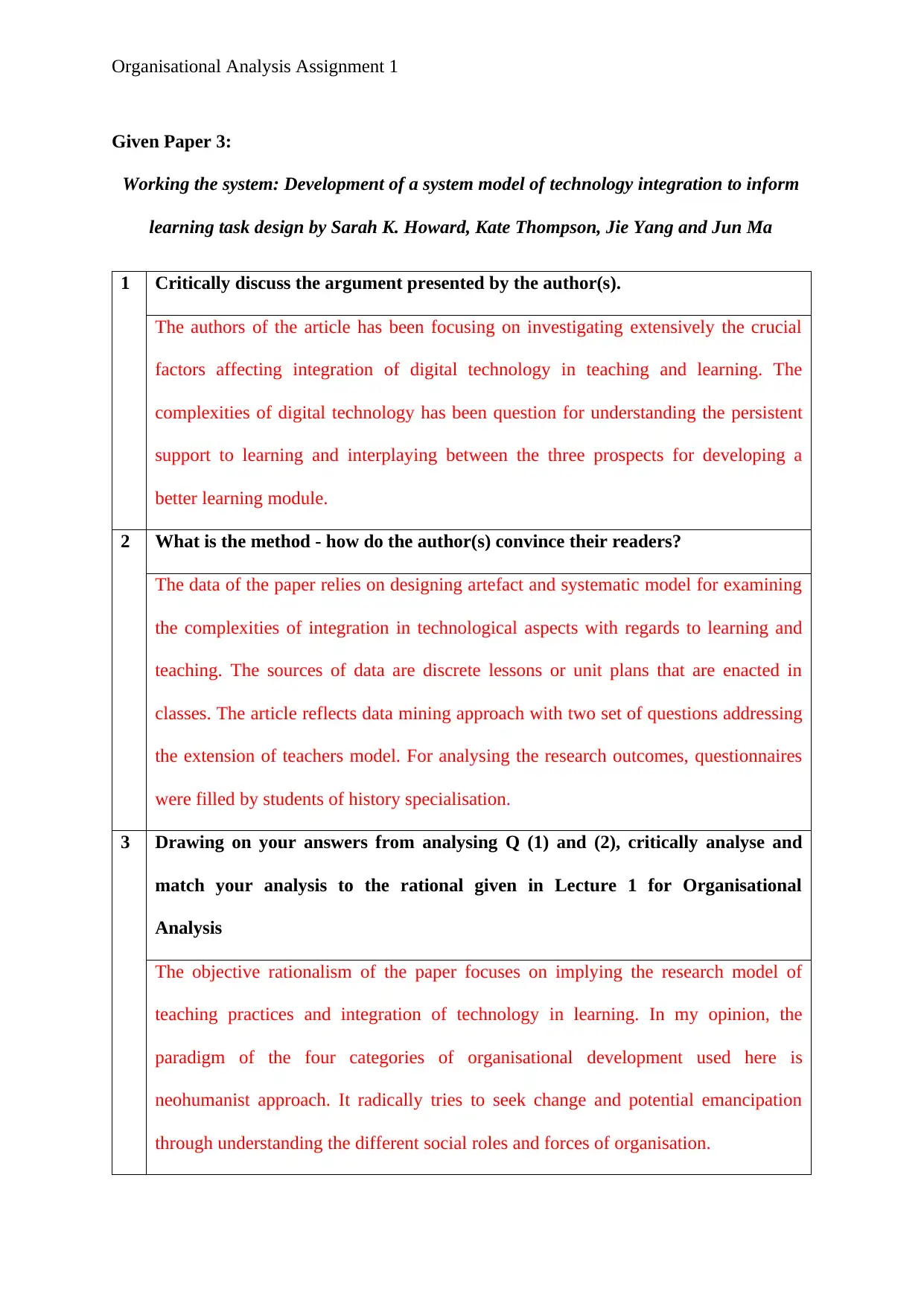
Organisational Analysis Assignment 1
Given Paper 3:
Working the system: Development of a system model of technology integration to inform
learning task design by Sarah K. Howard, Kate Thompson, Jie Yang and Jun Ma
1 Critically discuss the argument presented by the author(s).
The authors of the article has been focusing on investigating extensively the crucial
factors affecting integration of digital technology in teaching and learning. The
complexities of digital technology has been question for understanding the persistent
support to learning and interplaying between the three prospects for developing a
better learning module.
2 What is the method - how do the author(s) convince their readers?
The data of the paper relies on designing artefact and systematic model for examining
the complexities of integration in technological aspects with regards to learning and
teaching. The sources of data are discrete lessons or unit plans that are enacted in
classes. The article reflects data mining approach with two set of questions addressing
the extension of teachers model. For analysing the research outcomes, questionnaires
were filled by students of history specialisation.
3 Drawing on your answers from analysing Q (1) and (2), critically analyse and
match your analysis to the rational given in Lecture 1 for Organisational
Analysis
The objective rationalism of the paper focuses on implying the research model of
teaching practices and integration of technology in learning. In my opinion, the
paradigm of the four categories of organisational development used here is
neohumanist approach. It radically tries to seek change and potential emancipation
through understanding the different social roles and forces of organisation.
Given Paper 3:
Working the system: Development of a system model of technology integration to inform
learning task design by Sarah K. Howard, Kate Thompson, Jie Yang and Jun Ma
1 Critically discuss the argument presented by the author(s).
The authors of the article has been focusing on investigating extensively the crucial
factors affecting integration of digital technology in teaching and learning. The
complexities of digital technology has been question for understanding the persistent
support to learning and interplaying between the three prospects for developing a
better learning module.
2 What is the method - how do the author(s) convince their readers?
The data of the paper relies on designing artefact and systematic model for examining
the complexities of integration in technological aspects with regards to learning and
teaching. The sources of data are discrete lessons or unit plans that are enacted in
classes. The article reflects data mining approach with two set of questions addressing
the extension of teachers model. For analysing the research outcomes, questionnaires
were filled by students of history specialisation.
3 Drawing on your answers from analysing Q (1) and (2), critically analyse and
match your analysis to the rational given in Lecture 1 for Organisational
Analysis
The objective rationalism of the paper focuses on implying the research model of
teaching practices and integration of technology in learning. In my opinion, the
paradigm of the four categories of organisational development used here is
neohumanist approach. It radically tries to seek change and potential emancipation
through understanding the different social roles and forces of organisation.
⊘ This is a preview!⊘
Do you want full access?
Subscribe today to unlock all pages.

Trusted by 1+ million students worldwide
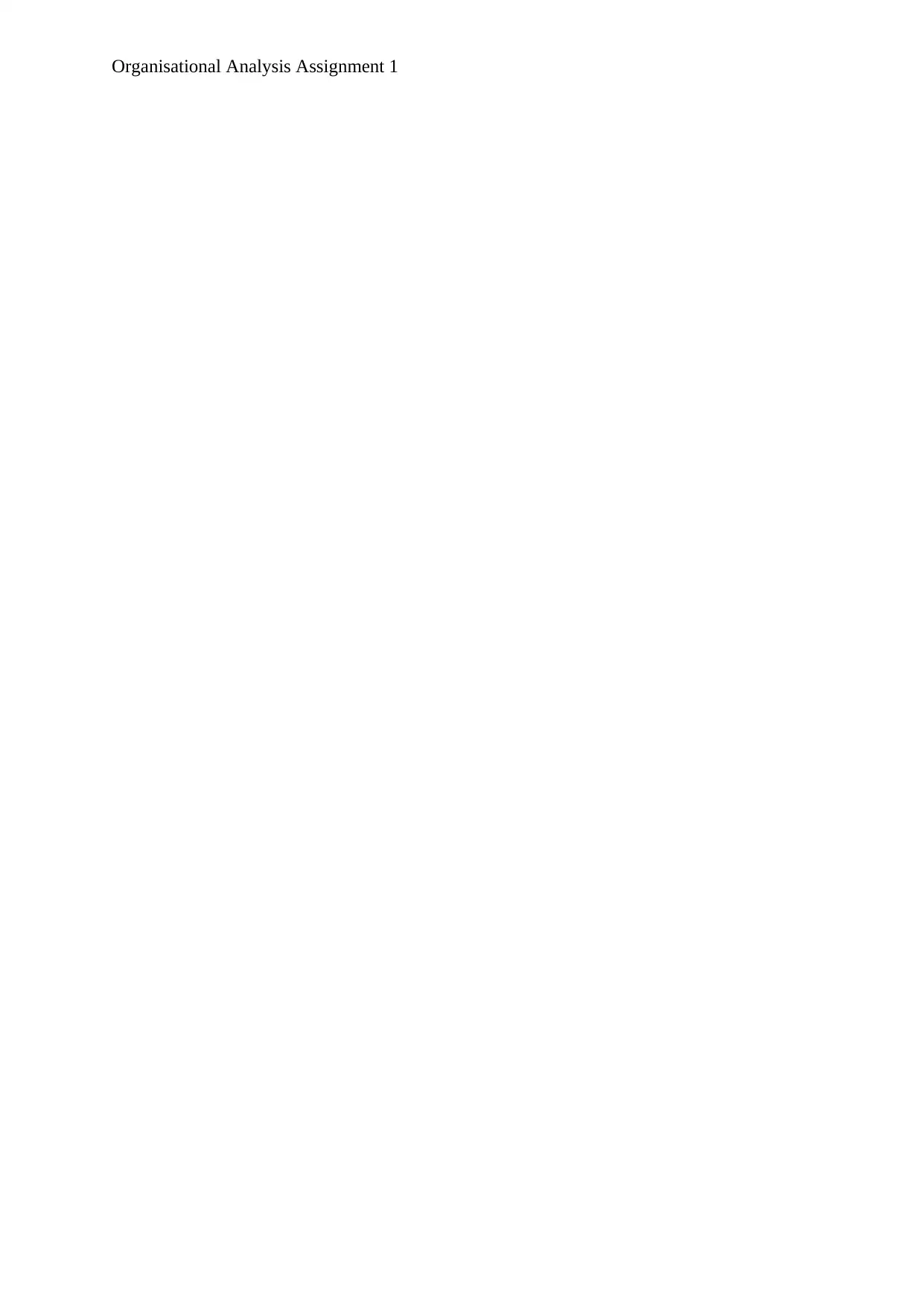
Organisational Analysis Assignment 1
Paraphrase This Document
Need a fresh take? Get an instant paraphrase of this document with our AI Paraphraser
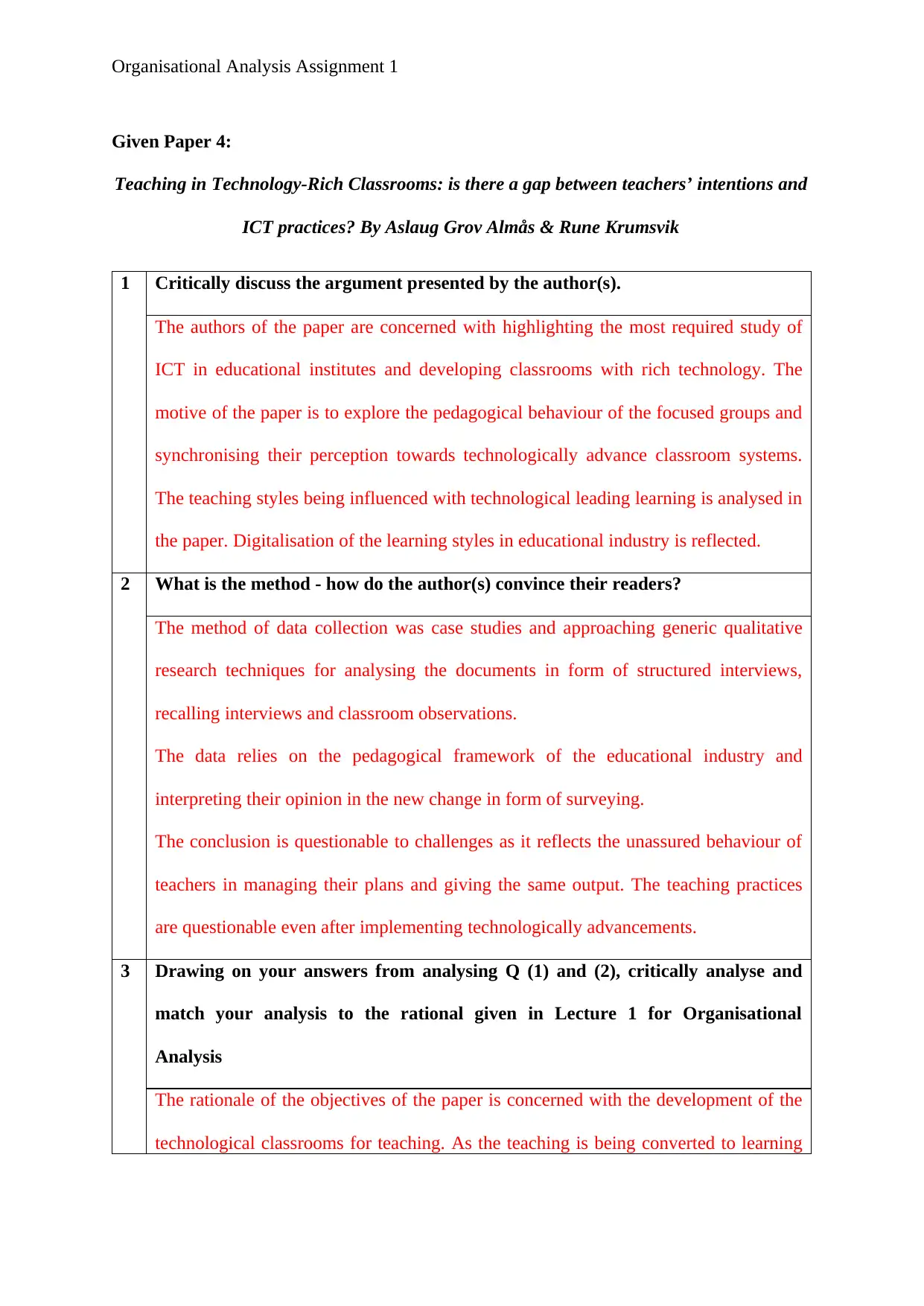
Organisational Analysis Assignment 1
Given Paper 4:
Teaching in Technology-Rich Classrooms: is there a gap between teachers’ intentions and
ICT practices? By Aslaug Grov Almås & Rune Krumsvik
1 Critically discuss the argument presented by the author(s).
The authors of the paper are concerned with highlighting the most required study of
ICT in educational institutes and developing classrooms with rich technology. The
motive of the paper is to explore the pedagogical behaviour of the focused groups and
synchronising their perception towards technologically advance classroom systems.
The teaching styles being influenced with technological leading learning is analysed in
the paper. Digitalisation of the learning styles in educational industry is reflected.
2 What is the method - how do the author(s) convince their readers?
The method of data collection was case studies and approaching generic qualitative
research techniques for analysing the documents in form of structured interviews,
recalling interviews and classroom observations.
The data relies on the pedagogical framework of the educational industry and
interpreting their opinion in the new change in form of surveying.
The conclusion is questionable to challenges as it reflects the unassured behaviour of
teachers in managing their plans and giving the same output. The teaching practices
are questionable even after implementing technologically advancements.
3 Drawing on your answers from analysing Q (1) and (2), critically analyse and
match your analysis to the rational given in Lecture 1 for Organisational
Analysis
The rationale of the objectives of the paper is concerned with the development of the
technological classrooms for teaching. As the teaching is being converted to learning
Given Paper 4:
Teaching in Technology-Rich Classrooms: is there a gap between teachers’ intentions and
ICT practices? By Aslaug Grov Almås & Rune Krumsvik
1 Critically discuss the argument presented by the author(s).
The authors of the paper are concerned with highlighting the most required study of
ICT in educational institutes and developing classrooms with rich technology. The
motive of the paper is to explore the pedagogical behaviour of the focused groups and
synchronising their perception towards technologically advance classroom systems.
The teaching styles being influenced with technological leading learning is analysed in
the paper. Digitalisation of the learning styles in educational industry is reflected.
2 What is the method - how do the author(s) convince their readers?
The method of data collection was case studies and approaching generic qualitative
research techniques for analysing the documents in form of structured interviews,
recalling interviews and classroom observations.
The data relies on the pedagogical framework of the educational industry and
interpreting their opinion in the new change in form of surveying.
The conclusion is questionable to challenges as it reflects the unassured behaviour of
teachers in managing their plans and giving the same output. The teaching practices
are questionable even after implementing technologically advancements.
3 Drawing on your answers from analysing Q (1) and (2), critically analyse and
match your analysis to the rational given in Lecture 1 for Organisational
Analysis
The rationale of the objectives of the paper is concerned with the development of the
technological classrooms for teaching. As the teaching is being converted to learning
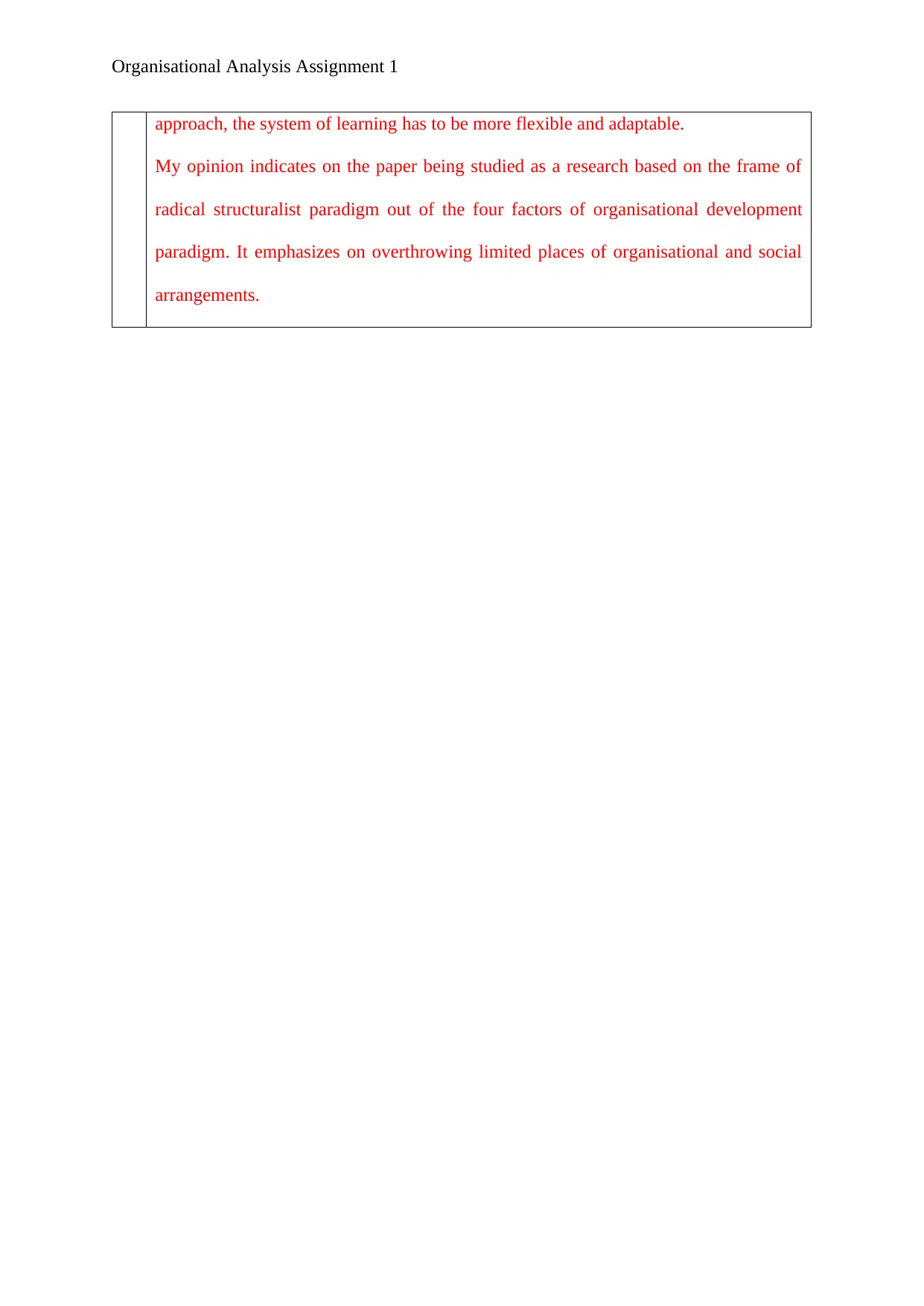
Organisational Analysis Assignment 1
approach, the system of learning has to be more flexible and adaptable.
My opinion indicates on the paper being studied as a research based on the frame of
radical structuralist paradigm out of the four factors of organisational development
paradigm. It emphasizes on overthrowing limited places of organisational and social
arrangements.
approach, the system of learning has to be more flexible and adaptable.
My opinion indicates on the paper being studied as a research based on the frame of
radical structuralist paradigm out of the four factors of organisational development
paradigm. It emphasizes on overthrowing limited places of organisational and social
arrangements.
⊘ This is a preview!⊘
Do you want full access?
Subscribe today to unlock all pages.

Trusted by 1+ million students worldwide
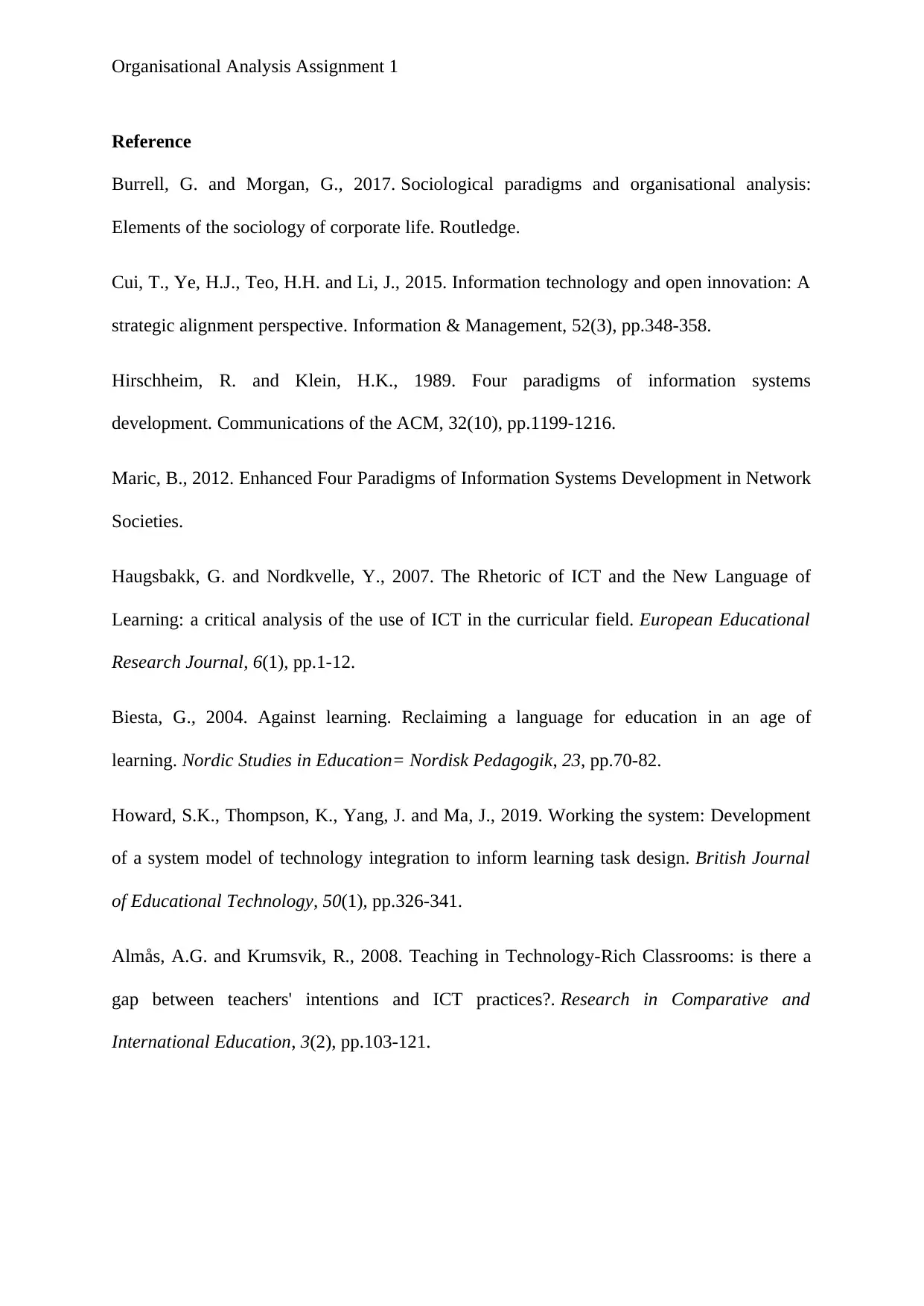
Organisational Analysis Assignment 1
Reference
Burrell, G. and Morgan, G., 2017. Sociological paradigms and organisational analysis:
Elements of the sociology of corporate life. Routledge.
Cui, T., Ye, H.J., Teo, H.H. and Li, J., 2015. Information technology and open innovation: A
strategic alignment perspective. Information & Management, 52(3), pp.348-358.
Hirschheim, R. and Klein, H.K., 1989. Four paradigms of information systems
development. Communications of the ACM, 32(10), pp.1199-1216.
Maric, B., 2012. Enhanced Four Paradigms of Information Systems Development in Network
Societies.
Haugsbakk, G. and Nordkvelle, Y., 2007. The Rhetoric of ICT and the New Language of
Learning: a critical analysis of the use of ICT in the curricular field. European Educational
Research Journal, 6(1), pp.1-12.
Biesta, G., 2004. Against learning. Reclaiming a language for education in an age of
learning. Nordic Studies in Education= Nordisk Pedagogik, 23, pp.70-82.
Howard, S.K., Thompson, K., Yang, J. and Ma, J., 2019. Working the system: Development
of a system model of technology integration to inform learning task design. British Journal
of Educational Technology, 50(1), pp.326-341.
Almås, A.G. and Krumsvik, R., 2008. Teaching in Technology-Rich Classrooms: is there a
gap between teachers' intentions and ICT practices?. Research in Comparative and
International Education, 3(2), pp.103-121.
Reference
Burrell, G. and Morgan, G., 2017. Sociological paradigms and organisational analysis:
Elements of the sociology of corporate life. Routledge.
Cui, T., Ye, H.J., Teo, H.H. and Li, J., 2015. Information technology and open innovation: A
strategic alignment perspective. Information & Management, 52(3), pp.348-358.
Hirschheim, R. and Klein, H.K., 1989. Four paradigms of information systems
development. Communications of the ACM, 32(10), pp.1199-1216.
Maric, B., 2012. Enhanced Four Paradigms of Information Systems Development in Network
Societies.
Haugsbakk, G. and Nordkvelle, Y., 2007. The Rhetoric of ICT and the New Language of
Learning: a critical analysis of the use of ICT in the curricular field. European Educational
Research Journal, 6(1), pp.1-12.
Biesta, G., 2004. Against learning. Reclaiming a language for education in an age of
learning. Nordic Studies in Education= Nordisk Pedagogik, 23, pp.70-82.
Howard, S.K., Thompson, K., Yang, J. and Ma, J., 2019. Working the system: Development
of a system model of technology integration to inform learning task design. British Journal
of Educational Technology, 50(1), pp.326-341.
Almås, A.G. and Krumsvik, R., 2008. Teaching in Technology-Rich Classrooms: is there a
gap between teachers' intentions and ICT practices?. Research in Comparative and
International Education, 3(2), pp.103-121.
1 out of 10
Related Documents
Your All-in-One AI-Powered Toolkit for Academic Success.
+13062052269
info@desklib.com
Available 24*7 on WhatsApp / Email
![[object Object]](/_next/static/media/star-bottom.7253800d.svg)
Unlock your academic potential
Copyright © 2020–2026 A2Z Services. All Rights Reserved. Developed and managed by ZUCOL.





